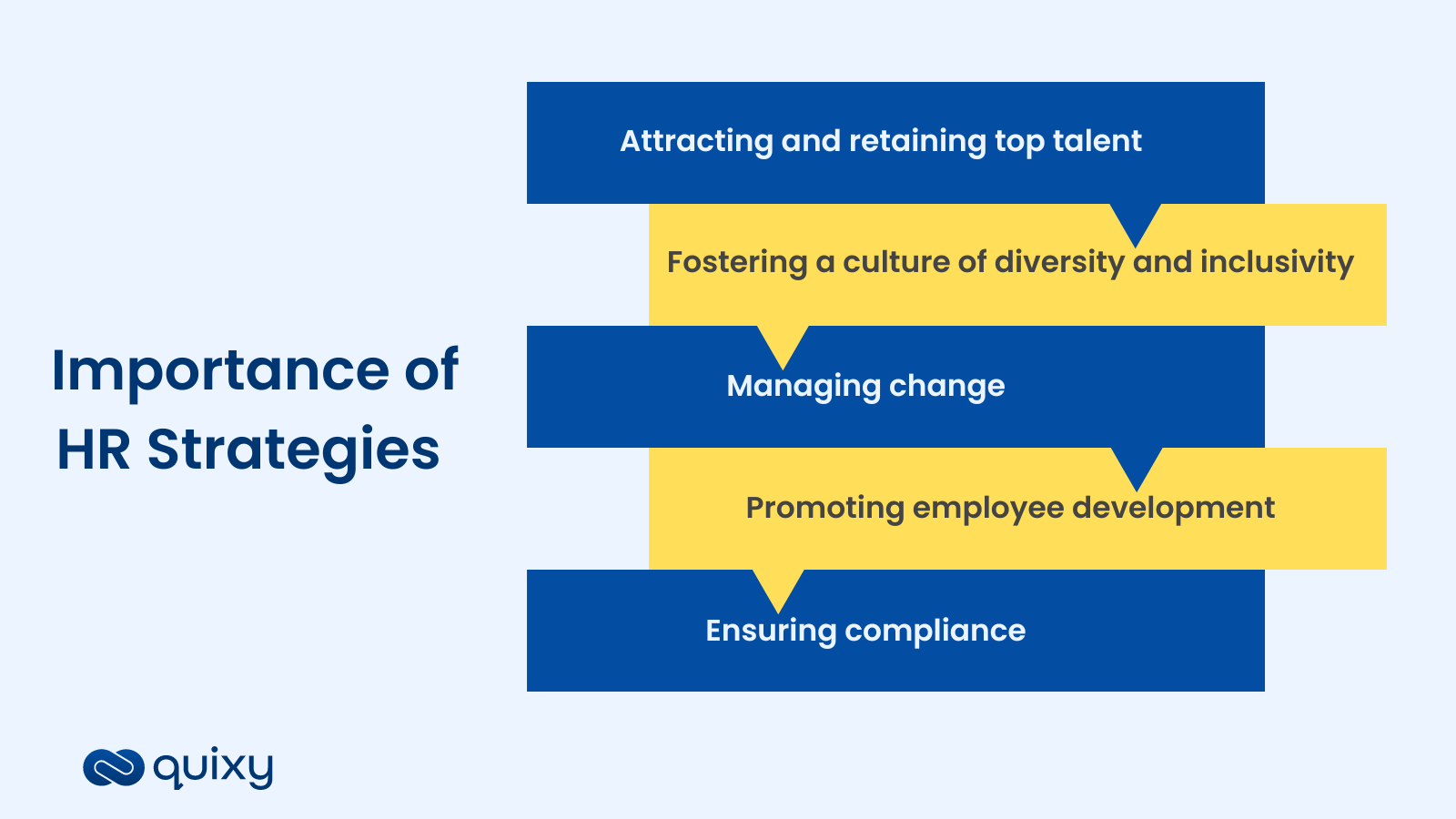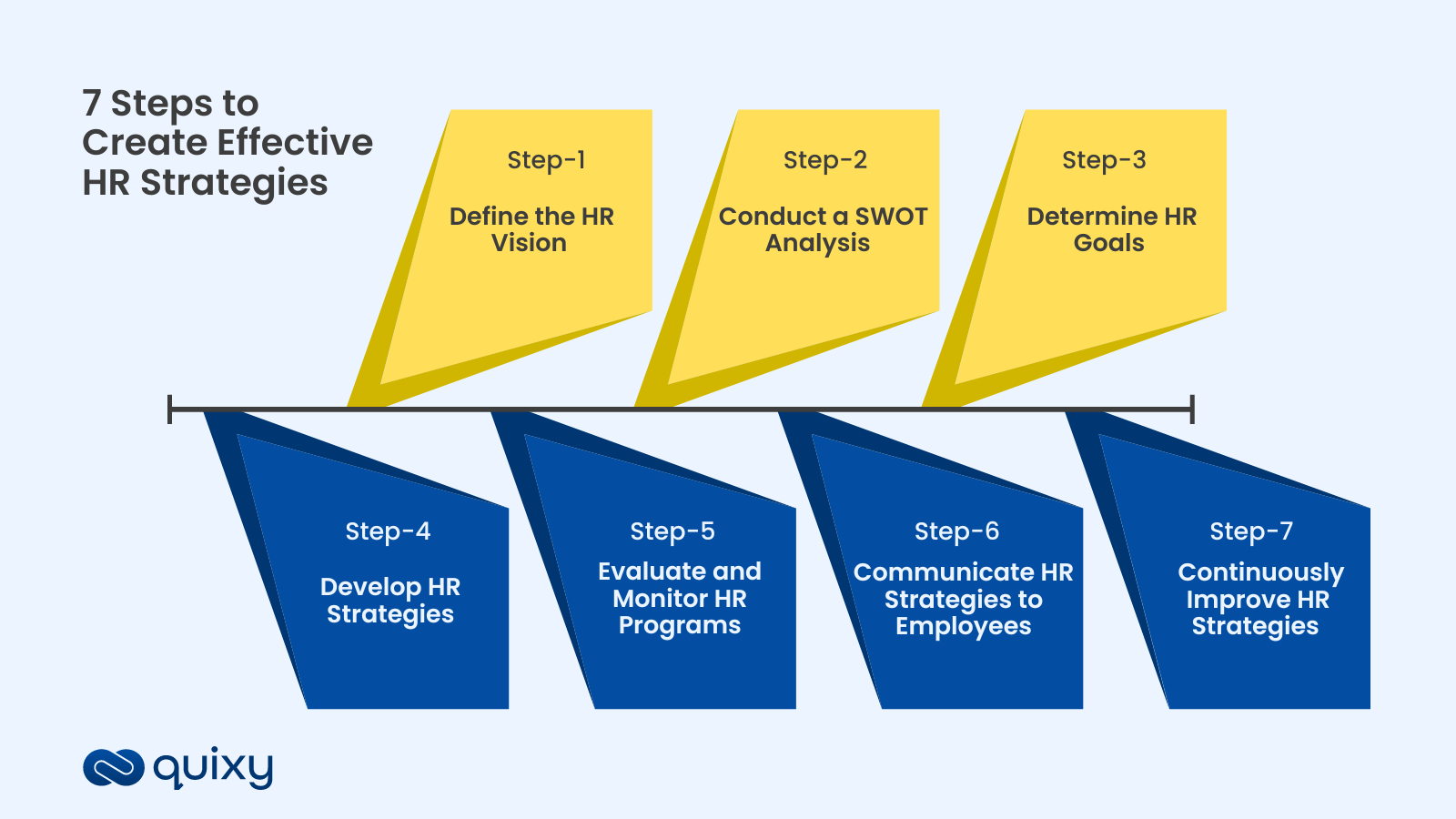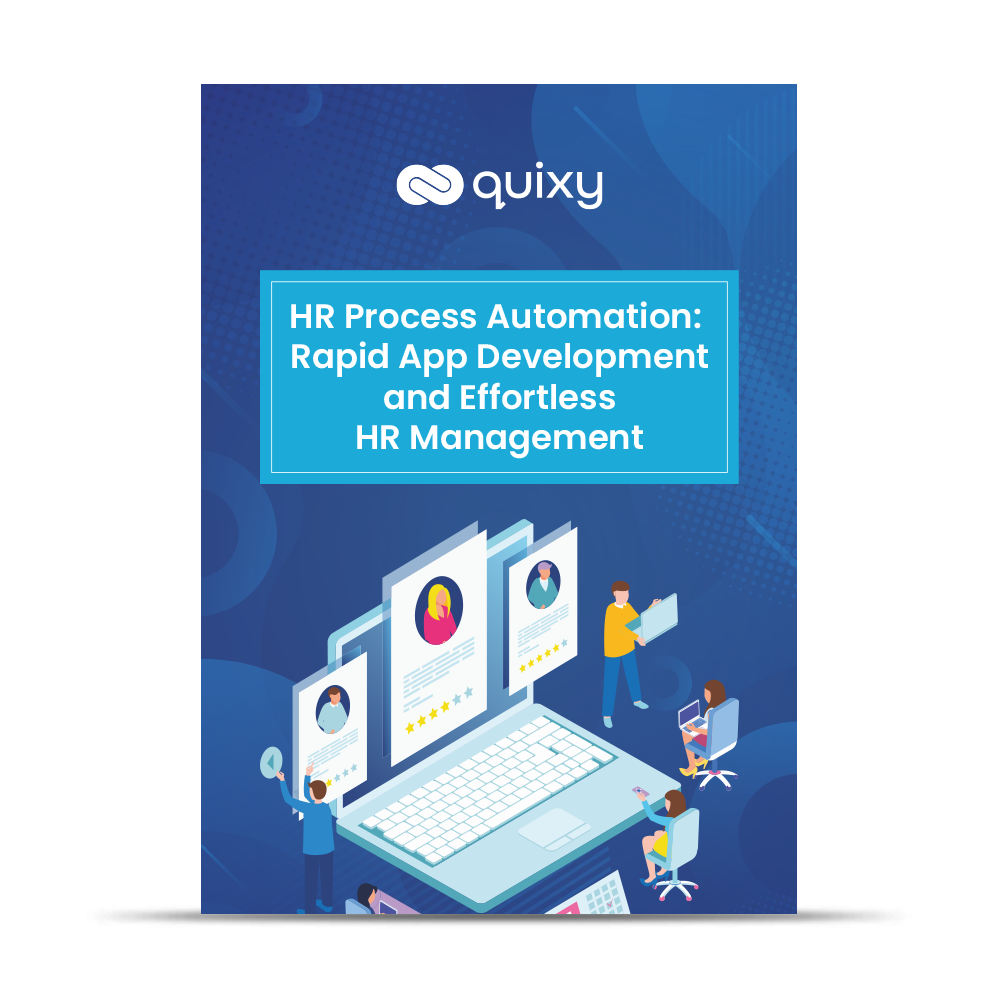
Human resources management strategies are critical to success in today’s rapidly changing business environment. With the fast pace of change, businesses must be agile and adaptable to thrive, and effective HR strategies are key to this.
Organizations that prioritize human resources tend to outperform those that don’t. A study by Society for Human Resource Management (SHRM) stats, companies with strong human resource management strategies and practices have a competitive advantage and improved financial performance. Another study by McKinsey stated that organizations that can reallocate their talents within their strategic plans are more than twice as likely to outdo their peers. These statistics highlight the importance of strategic HR management for organizational success.
What is Human Resource Management?
Human Resource Management (HRM) is the strategic approach to managing an organization’s workforce. It focuses on getting the best out of employees to achieve the company’s goals. Here’s a breakdown of its key aspects:
Overall Function
- HRM aims to recruit, develop, and retain a talented workforce that contributes to the organization’s success.
- It ensures employees are happy, motivated, and have the resources they need to perform well.
Key Responsibilities
- Recruitment & Selection: Attracting qualified candidates, screening applicants, and selecting the best fit for open positions.
- Training & Development: Providing employees with the skills and knowledge they need to excel in their roles.
- Performance Management: Setting goals, evaluating employee performance, and providing feedback for improvement.
- Compensation & Benefits: Developing fair and competitive salary structures and offering attractive benefits packages.
- Employee Relations: Maintaining positive relationships with employees, addressing concerns, and fostering a healthy work environment.
- Compliance: Ensuring the organization adheres to all labor laws and regulations.
Also Read: Remote Workforce Management 101: The Ultimate Comprehensive Guide
Benefits of Effective HRM
- Increased employee productivity and engagement
- Reduced turnover and absenteeism
- Improved employer branding and talent attraction
- Stronger company culture and morale
HRM plays a critical role in an organization’s success. By investing in its people, a company can build a strong and competitive workforce that drives positive results.
What is Human Resource Management Strategy?
Human Resource Management (HRM) strategies are plans and approaches designed to effectively manage an organization’s workforce to achieve its goals and objectives. These strategies align HR practices with the overall business strategy to enhance employee performance, engagement, and retention.
Here are a few reasons why HR strategies are so critical to business success in today’s world:
Importance of Human Resource Management Strategy

1. Attracting and retaining top talent
In today’s competitive job market, businesses must work hard to attract and retain top talent, Which is where effective HR management strategies come in. HR professionals can help organizations maintain a competitive advantage and build a strong and productive workforce by developing and implementing effective recruitment, retention, and compensation strategies. This is especially important in industries experiencing rapid growth, where competition for the best employees can be intense.
2. Fostering a culture of diversity and inclusivity
A diverse and inclusive workplace culture can significantly impact an organization’s success. HR professionals are critical in promoting such a culture by developing and implementing policies and programs that support diversity and inclusivity.
This can include programs that support equal employment opportunities, provide training and development opportunities, and create a supportive work environment. Employees who feel seen, valued, and supported are more likely to be productive, fulfilled, motivated, and engaged, which can drive business success.
3. Managing change
Change is a constant in today’s business environment, and effective HR strategies are critical to managing it effectively. Whether organizations are undergoing a period of growth, restructuring, or dealing with the impacts of the pandemic, HR professionals play a vital role in communicating change effectively, managing employee relations, and providing support. By working with employees, HR professionals can help organizations navigate change smoothly, minimize disruption, and maintain a productive and engaged workforce.
4. Promoting employee development
Employee development is critical to HR strategies, as it helps employees grow and advance in their careers. HR professionals are vital in promoting employee development by providing training and development opportunities, supporting career advancement, and creating a supportive work environment. When employees feel they have opportunities to grow and advance, they are more likely to be productive, motivated, and engaged, which can drive business success.

5. Ensuring compliance
HR professionals are critical in ensuring organizations comply with labor laws and regulations. This includes ensuring that employees are paid fairly, that working conditions are safe and healthy, and that employee rights are protected. By ensuring compliance, HR professionals can save the company and its employees from legal liabilities, maintain a positive reputation, and promote ethical behavior.
To be successful in today’s business environment, organizations also must embrace digital transformation and the use of technology. This includes leveraging HR technologies, such as HR analytics, recruitment software, and e-learning platforms, to streamline processes, improve decision-making, and enhance employee engagement. By embracing technology, HR professionals can better manage human capital and drive business success.
Difference Between Human Resource Management (HRM) and Strategic Human Resource Management (SHRM)
| Feature | HRM | SHRM |
|---|---|---|
| Focus | Day-to-day HR operations | Long-term business strategy |
| Scope | Administrative (payroll, recruitment, compliance) | Proactive (workforce planning, talent development) |
| Approach | Reactive – Addresses current HR needs | Proactive – Aligns HR with business goals |
| Timeframe | Short-term (immediate workforce needs) | Long-term (future talent and growth strategies) |
| Integration | HR operates independently | HR integrated with business strategy |
| Key Activities | Hiring, training, compensation, compliance | Workforce analytics, leadership development, change management |
HRM ensures smooth HR operations, while SHRM transforms HR into a strategic partner, helping businesses gain a competitive edge. Modern HR software supports this shift by automating routine work, freeing HR professionals to focus on strategy.
Now that we have understood the sheer importance of HR to organizations, you must be wondering, “How do we get started on creating effective human resource management strategies?”
You need not worry because we have got you covered.
Also Read: No-code: A Superpower for Human Resource Teams
The Critical Impact of Effective HR Strategies: Data-Driven Reasons
In today’s competitive business landscape, organizations that prioritize strong Human Resource (HR) strategies outperform those that don’t. Effective HR practices aren’t just a “nice to have” – they’re a strategic investment with a measurable impact on your bottom line. Here’s why:
1. Boosting Retention and Reducing Costs
- High turnover is expensive: According to the Society for Human Resource Management (SHRM), a bad hire can cost a company up to twice the employee’s annual salary. Effective HR strategies that focus on recruitment, onboarding, and employee engagement can significantly reduce turnover, saving your company money.
- Data on Retention: A study by the Work Institute found that companies with strong onboarding programs experience 50% lower new-hire turnover within the first six months. Additionally, Gallup reports that organizations with highly engaged employees see a 17% increase in productivity and a 21% increase in profitability.
2. Attracting Top Talent and Building a Strong Employer Brand
- The War for Talent: In today’s competitive job market, attracting and retaining top talent is crucial. A study by Glassdoor found that 69% of job seekers consider a company’s reputation as an employer before applying for a position.
- Data on Employer Branding: A study by LinkedIn revealed that companies with strong employer brands receive 50% more qualified applicants. Additionally, a study by the Aberdeen Group found that companies with strong employer brands experience a 43% decrease in cost-per-hire.
3. Driving Productivity and Performance
- Engaged Employees Deliver More: Research by Gallup shows that highly engaged employees are 21% more productive than their less engaged counterparts. Effective HR strategies that promote employee development, recognition, and well-being contribute to a more engaged workforce.
- Data on Performance: A study by the Society for Human Resource Management (SHRM) found that companies with high-performing HR practices reported a 15% increase in shareholder return on investment (ROI) compared to those with lower-performing HR practices.
4. Mitigating Risk and Ensuring Compliance
- HR Protects Your Business: Effective HR strategies ensure your organization complies with labor laws and regulations. This helps avoid costly legal fees and penalties associated with discrimination, wrongful termination, and safety violations.
- Data on Compliance Costs: A 2020 report by the Equal Employment Opportunity Commission (EEOC) found that the median settlement amount for a single lawsuit filed with the agency was $40,000. Strong HR practices that emphasize training and clear communication can help reduce the risk of compliance issues.
By implementing effective HR strategies, organizations can:
- Reduce turnover and associated costs
- Attract and retain top talent
- Improve employee engagement and well-being
- Boost productivity and performance
- Mitigate legal risks
- Enhance employer branding
Investing in strong HR practices is a strategic decision with a demonstrably positive impact on your organization’s success.
11 HR strategy examples to learn from
Cisco: Virtual Onboarding
- Automation Focus: Enhancing the new hire experience.
- Example: Cisco uses a virtual onboarding platform that automates paperwork, training assignments, and equipment provisioning. New hires can complete onboarding tasks remotely, and managers are notified of each step’s completion. This has streamlined the onboarding process, especially for remote employees.
Walmart: Employee Scheduling Automation
- Automation Focus: Optimizing workforce scheduling.
- Example: Walmart implemented a scheduling algorithm that considers store traffic, employee availability, and labor laws to create optimized shift schedules. This ensures the right number of employees are working at peak times, improving customer service and reducing labor costs.
Adidas: Chatbots for Employee Support
- Automation Focus: Improving HR service delivery.
- Example: Adidas introduced an HR chatbot to answer employee questions about benefits, policies, and payroll. The chatbot uses natural language processing (NLP) to provide instant responses, freeing up HR staff to focus on more strategic tasks. This has improved employee satisfaction and reduced HR workload.
Zappos: Holacracy and HR Automation
- Automation Focus: Redefining organizational structure.
- Example: Zappos implemented a holacracy model (a self-management system) and used HR automation tools to support it. Employees have access to platforms that automate task assignments, performance tracking, and feedback collection. This has reduced the need for traditional managers and empowered employees to take ownership of their roles.
Starbucks: Mobile App for Employee Engagement
- Automation Focus: Enhancing employee communication.
- Example: Starbucks developed a mobile app for employees to access schedules, benefits, and training materials. The app also includes a gamified learning platform where employees can earn rewards for completing training modules. This has improved engagement and made it easier for employees to access HR resources.
Siemens: Digital Twin for Workforce Planning
- Automation Focus: Simulating workforce scenarios.
- Example: Siemens uses digital twin technology to create virtual models of its workforce. These models simulate different scenarios, such as workforce reductions, expansions, or skill shortages, helping HR leaders make data-driven decisions. This approach ensures Siemens can adapt to changing business needs.
Accenture: Skills Mapping with AI
- Automation Focus: Identifying and developing employee skills.
- Example: Accenture uses AI-powered skills mapping tools to analyze employee skills and match them with project needs. The system recommends training programs to fill skill gaps and helps managers build high-performing teams. This ensures Accenture’s workforce remains agile and competitive.
Learning and Development Strategy: Amazon
- Focus: Upskilling employees to meet future business needs.
- Example: Amazon’s Upskilling 2025 program invests $1.2 billion to train 300,000 employees in new skills, such as cloud computing, machine learning, and robotics. This strategy ensures employees are prepared for evolving roles and helps Amazon stay competitive in the tech industry.
Change Management Strategy: General Electric (GE)
- Focus: Managing organizational change effectively.
- Example: During its transition from a traditional industrial company to a digital industrial leader, GE implemented a change management strategy that included clear communication, employee training, and leadership development. This helped employees adapt to new technologies and processes.
Remote Work Strategy: Spotify
- Focus: Supporting a hybrid work model.
- Example: Spotify introduced its Work From Anywhere program, allowing employees to choose whether they want to work from home, the office, or a co-working space. The company provides flexibility and ensures employees have the tools and resources they need to succeed in a hybrid environment.
Global HR Strategy: Unilever
- Focus: Managing a diverse, global workforce.
- Example: Unilever uses a global HR strategy that standardizes core HR practices (e.g., performance management, leadership development) while allowing flexibility to adapt to local cultures and regulations. This ensures consistency while respecting regional differences.
7 Steps of HRM: Creating a Perfect Effective Human Resource Management Strategy
Human resources management is crucial for the success of a business. HR is responsible for recruiting, managing, and developing employees, ensuring they have the skills and support to drive the business forward. Here are seven steps to creating an effective HR management strategy.

Step 1: Define the HR Vision
Defining the HR vision is the first step in creating a successful HR strategy, and this should be aligned with the overall vision and mission of the organization. The HR vision should be clear, concise, and achievable, ensuring that everyone understands the role of HR within the organization.
Step 2: Conduct a SWOT Analysis
A SWOT analysis is a useful method for creating an effective HR strategy. SWOT expands to Strengths, Weaknesses, Opportunities, and Threats. This analysis will help identify the internal and external factors affecting HR, allowing you to make informed decisions when developing the HR strategy.
Step 3: Determine HR Goals
Once you clearly understand the HR vision and the SWOT analysis, you can determine the HR goals. These goals should be SMART(specific, measurable, attainable, relevant, and time-bound). HR goals should align with the organization’s overall goals and be focused on improving the employee experience and driving business success.
Step 4: Develop HR Strategies
With the HR vision and goals in place, the next step is to develop HR strategies. These strategies should focus on achieving the HR goals, ensuring all employees are engaged and motivated to meet the goals. The strategy should also focus on improving the employee experience, reducing turnover, and attracting the best talent.
Step 5: Evaluate and Monitor HR Programs
Evaluating and monitoring HR programs is essential to ensure that HR strategies are effective. Regularly monitoring the programs will allow you to identify issues and make necessary adjustments to improve the employee experience and drive business success.
Step 6: Communicate HR Strategies to Employees
Communicating the HR strategies to employees is critical. This will ensure that everyone understands the role of HR and how it supports the organization. Regular communication will also inform employees of changes, keeping them engaged and motivated.
Step 7: Continuously Improve HR Strategies
The final step in creating effective Human Resource Management strategies is continuously improving them. Keeping up-to-date with changes in the HR industry and best practices will allow you to stay ahead of the competition and ensure your HR strategies remain relevant and practical.
If these steps are followed, organizations can reap many business benefits by leveraging HR. Strategic human resource management is critical to businesses’ success as information sharing has replicated resources in no time. However, culture and human resource capability are tough to replicate. It is also essential to use HR beyond just transactional processes. HR has the potential to act as a change and transformation agent for your organization. Integrating technology and digital platforms to enhance your organization’s human resource strategy is essential.
Also Read: Digital Transformation in HR
Revolutionizing HR Management Strategies with No-Code
With no-code, you don’t need to be a coding wizard or rely on tech gurus to bring your HR vision to life. Say goodbye to those mind-numbing hours spent deciphering lines of code. Instead, embrace the magic of a user-friendly, drag-and-drop interface that puts the power of strategy implementation firmly in your hands.
But it doesn’t stop there. Brace yourself for the incredible speed of innovation! No-code platforms enable lightning-fast prototyping and testing. Want to experiment with different HR approaches? Go ahead and try them out, tweak them, and see which ones work like a charm. It’s like having a virtual HR laboratory at your disposal, empowering you to confidently make data-driven decisions.
Imagine seamlessly integrating your Human Resource Management System and processes without breaking a sweat. With no-code, you can effortlessly bridge the gaps between different tools and technologies, ensuring they work together harmoniously. And that’s not all—automation becomes your new best friend. Mundane, repetitive tasks? Leave them to the bots while you focus on strategic planning and execution. Time saved, stress reduced, and efficiency amplified!
But wait, there’s more! Collaboration and communication become supercharged with no-code. Real-time feedback, brainstorming sessions, and idea sharing are just a click away. Your HR team becomes a powerhouse of creativity and innovation, propelling your strategies to new heights. Together, you’ll refine, improve, and create HR initiatives that wow everyone in the organization.
In a world that never stops evolving, agility and flexibility are the keys to staying ahead. With no-code, you become the master of adaptation. When market conditions change, you’ll pivot like a pro. From fine-tuning recruitment strategies to reimagining performance management, no-code empowers you to stay nimble, ensuring your HR strategies remain relevant and impactful.
So, ready to disrupt the HR landscape? Embrace the revolution! Unleash the power of no-code and elevate your HR management strategies to unprecedented levels. Get ready to conquer the digital era with a smile on your face and a toolkit that empowers you to achieve greatness. Say goodbye to outdated approaches and hello to a future where your HR strategies are the talk of the town!
Also Read : Ultimate Guide to Top-Notch Resource Management Software
Building Effective HR Management Strategies for the Digital-First Era
Organizations must develop robust HR management strategies to harness the potential of their workforce. By embracing digital tools and technologies, fostering a culture of continuous learning and adaptability, and prioritizing employee engagement and well-being, businesses can optimize their HR practices. Leveraging data and analytics allows for data-driven decision-making and the ability to track and measure the impact of HR initiatives. Additionally, integrating emerging technologies such as AI and automation streamlines HR processes, enabling HR professionals to focus on strategic activities. Building effective HR management strategies in the digital-first era empowers organizations to attract, retain, and develop top talent, driving business success and growth.

Embracing Digital Transformation in HR
The digital age has brought about significant changes in the workplace, and HR is no exception. To remain competitive and attract top talent, organizations must embrace digital transformation within their HR strategies. Here’s how technology can empower your HR team:
HR Technologies in Action
- HR Analytics: Imagine leveraging data to make data-driven decisions about your workforce. HR analytics platforms gather and analyze employee data, providing insights into areas like recruitment effectiveness, employee performance, and turnover trends. This data empowers HR professionals to identify areas for improvement and implement targeted strategies.
- Recruitment Software: Streamline your recruitment process with Applicant Tracking Systems (ATS). These platforms automate tasks like resume screening, scheduling interviews, and candidate communication, allowing HR professionals to focus on attracting and evaluating top talent.
- E-Learning Platforms: Invest in employee development by providing online training opportunities. E-learning platforms offer flexible and cost-effective ways to deliver training content on various topics, from onboarding new hires to upskilling existing employees.
Also Read : Ultimate Guide to Top-Notch Resource Management Software in 2024
The Rise of No-Code Solutions
No-code platforms empower HR professionals to build custom applications without needing coding expertise. These user-friendly tools offer drag-and-drop interfaces and pre-built templates, allowing HR teams to automate tasks, create workflows, and manage processes efficiently.
Benefits of No-Code
- Increased Efficiency: Automating repetitive tasks like onboarding paperwork or expense approvals frees up HR professionals’ time to focus on strategic initiatives.
- Improved Accuracy: No-code platforms reduce the risk of human error by automating data entry and calculations.
- Enhanced Employee Experience: Self-service portals powered by no-code solutions allow employees to easily access information, request leave, or submit feedback, improving overall satisfaction.
Challenges and Considerations for No-Code Adoption
- Choosing the Right Platform: With numerous no-code platforms available, carefully assess your specific needs and ensure the chosen platform integrates seamlessly with existing systems.
- Security and Data Privacy: Ensure the no-code platform offers robust security features to protect sensitive employee data.
- Scalability and Future Needs: Consider the platform’s ability to scale as your organization grows and your HR needs evolve.
Quixy: People-Focused HR Software for Strategic Growth
Quixy is a no-code low-code platform that empowers organizations to build custom HR software tailored to their unique needs. Unlike off-the-shelf solutions, Quixy allows HR teams to design and deploy applications without any coding expertise, ensuring that the software aligns perfectly with their processes, policies, and business goals. Whether it’s automating routine tasks, enhancing employee engagement, or streamlining complex workflows, Quixy provides the flexibility to create exactly what you need.
Why Build Custom HR Software with Quixy?
- No-Code Simplicity
- Quixy’s intuitive drag-and-drop interface makes it easy for anyone to design and customize HR applications. No technical skills are required, so HR teams can take full control of the development process.
- Example: Create a leave management app with custom approval workflows, notifications, and integration with attendance systems.
- Tailored to Your Needs
- Off-the-shelf HR software often comes with unnecessary features or lacks critical functionality. With Quixy, you can build applications that address your specific challenges and requirements.
- Example: Design a performance management system that aligns with your organization’s unique evaluation criteria and feedback processes.
- Rapid Deployment
- Quixy’s no-code platform allows you to build and deploy applications in days or weeks, not months. This agility ensures that your HR software evolves as quickly as your business needs.
- Example: Quickly roll out an onboarding app to streamline the hiring process for a sudden surge in new hires.
- Seamless Integration
- Quixy integrates with existing systems (e.g., ERP, CRM, payroll software) to ensure smooth data flow and eliminate silos. This makes it easy to create a unified HR ecosystem.
- Example: Build a recruitment tracking app that integrates with your ATS and email systems to automate candidate communication.
- Scalability
- As your organization grows, Quixy scales with you. You can easily modify or expand your HR applications to accommodate new processes, policies, or workforce demands.
- Example: Start with a basic employee self-service portal and later add features like training modules or benefits management.
What Can You Build with Quixy?
HR teams need more than just spreadsheets and emails to manage their workforce efficiently. With Quixy’s no-code platform, you can build custom HR software tailored to your organization’s needs—automating processes, improving employee experience, and freeing up time for strategic initiatives.
Here are some examples of HR applications you can create with Quixy:
1. Employee Onboarding App
- Automate document collection, training assignments, and equipment provisioning.
- Include personalized checklists for new hires and automated notifications for managers.
- Benefit: Reduces onboarding time and ensures a consistent experience for all employees.
2. Leave and Attendance Management System
- Create a system for employees to request leave, track balances, and view attendance records.
- Automate approvals, notifications, and integration with payroll.
- Benefit: Eliminates manual errors and simplifies compliance with labor laws.
3. Performance Management Platform
- Build a platform for goal setting, continuous feedback, and performance reviews.
- Include dashboards for tracking progress and generating reports.
- Benefit: Aligns employee goals with business objectives and fosters a culture of continuous improvement.
4. Employee Self-Service Portal
- Develop a portal where employees can access payslips, update personal information, and submit requests.
- Include features like training resources, benefits information, and company announcements.
- Benefit: Reduces HR’s administrative workload and empowers employees to manage their own data.
5. Recruitment Tracking System
- Create a system to track job applications, schedule interviews, and communicate with candidates.
- Automate resume screening and candidate scoring based on predefined criteria.
- Benefit: Speeds up hiring and improves the candidate experience.
6. Employee Engagement Surveys
- Build an app to conduct pulse surveys, collect feedback, and analyze results.
- Include real-time dashboards to track engagement trends and identify areas for improvement.
- Benefit: Helps HR take proactive steps to boost employee morale and retention.
7. Training and Development Platform
- Design a platform to assign training modules, track progress, and issue certifications.
- Include gamification elements like badges and leaderboards to motivate employees.
- Benefit: Ensures employees have the skills needed to meet business goals.
And That’s Not All!
The power of Quixy extends beyond just HR. Whether it’s automating compliance tracking, employee exit processes, or workforce analytics, you can build custom applications to fit your exact needs—without writing a single line of code. If there’s a workflow you want to simplify, Quixy makes it happen!
Conclusion
Organizations must be agile and adaptable in today’s fast-paced and ever-changing business landscape. No-code application development can enable business users to develop HR solutions that are unique to the business. It can turn inefficient business processes into streamlined workflows. HR plays a critical role in this transformation by developing and implementing talent management programs that build the skills and competencies necessary to meet the organization’s future needs. In short, organizations that take HR seriously have a better chance of success in today’s dynamic business environment.
Quixy isn’t just a tool—it’s a strategic enabler that helps organizations build custom HR software tailored to their needs. By automating processes, improving employee experience, and freeing up time for strategic initiatives, Quixy transforms HR into a true business partner.
Whether you need a simple leave management app or a comprehensive HR ecosystem, Quixy gives you the tools to create exactly what you need, when you need it.
Ready to transform your HR operations? Quixy is here to help! Get started now and experience the power of automation and app creation, all without the need for coding skills.
Frequently Asked Questions(FAQs)
Q. How can no-code platforms revolutionize HR management strategies?
No-code platforms revolutionize HR management strategies by empowering HR professionals to take control of strategy implementation without coding knowledge. These intuitive tools offer drag-and-drop interfaces and pre-built templates, enabling quick and efficient execution. With no-code, HR teams can streamline processes, iterate rapidly, and adapt strategies as needed, keeping up with the evolving business landscape.
Q. How does no-code simplify the implementation of HR strategies?
No-code simplifies the implementation of HR strategies by eliminating the need for complex coding and programming. HR professionals can leverage user-friendly interfaces and pre-built components to design and deploy strategies effortlessly. This removes dependencies on IT departments or external developers, allowing HR teams to drive strategy execution independently.
Q. Can no-code platforms help in rapid prototyping and testing of HR strategies?
Absolutely! No-code platforms enable HR teams to rapidly prototype and test different HR strategies. With intuitive interfaces, drag-and-drop functionality, and ready-made modules, HR professionals can quickly create and iterate on strategies. This facilitates agile experimentation and data-driven decision-making, helping identify the most effective approaches without lengthy development cycles.
Q. How does seamless integration and automation enhance HR strategy execution?
Seamless integration and automation offered by no-code platforms enhance HR strategy execution by integrating with existing HR systems and automating repetitive tasks. This integration eliminates data silos, streamlines workflows, and improves data accuracy. Automation frees up HR professionals’ time, allowing them to focus on strategic planning and execution, resulting in increased productivity and efficiency.
Q. What is the role of communication in revolutionizing HR strategies?
Collaboration and communication are vital in revolutionizing HR strategies with no-code. No-code platforms facilitate real-time collaboration, enabling HR teams to work together, share ideas, and provide feedback. This fosters a culture of innovation, enhances cross-functional collaboration, and ensures that HR strategies benefit from diverse perspectives, leading to more effective and impactful outcomes.
Q. Can no-code solutions keep up with the latest trends?
Yes, no-code solutions can keep up with the latest trends & best practices in HR management. No-code platforms often provide regular updates and new features, keeping pace with industry advancements. Additionally, the flexibility of no-code allows HR professionals to adapt their strategies to incorporate emerging trends and implement best practices, ensuring their HR management stays current and competitive.
Q. What are the potential challenges of no-code in HR management strategies?
While implementing no-code in HR management strategies brings numerous benefits, it’s essential to consider potential challenges. HR professionals should ensure the chosen no-code platform aligns with their specific requirements and integrates well with existing systems. They should also consider the learning curve for the platform and the need for proper training. Additionally, data security, scalability, and long-term support should be carefully evaluated to ensure a successful implementation journey.
Subscribe
Login
Please login to comment
0 Comments
Oldest
















